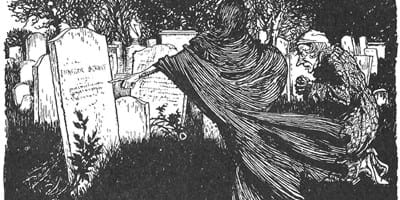I think the reason this carol continues to be so loved is the fitting union of poetic language and musical structure. In both lyric and melody, each verse begins in a lowly place, gradually building in anticipation until the majesty of the subject gloriously bursts forth, before subsiding again to a contemplative end.
Unfortunately, many, perhaps a majority, who enjoy this carol, will do so without considering the subject at all. The exhortation to “Fall on your knees” will herald out with clarity in verse one, but ultimately go unheeded. In the further verses, some may enjoy the thought that “He knows our need”, or that “chains shall he break”, but our hearts will likely not want to admit that the need being spoken of is our own sin. And while we may happily accept the Saviour’s help on our own terms, this carol is challenging us personally to “Behold your King” and then “before Him lowly bend” – on His terms. Will you do this?
Perhaps you may ask: why should I bow before Jesus Christ? Why should I proclaim that “Christ is the Lord”? The answer is in the carol, though it is not as clear in our English translation as it was in the original French lyrics.
The original poem was written in 1843 by Placide Cappeau to celebrate the renovation of the organ in the local parish church in Roquemaure, France. Four years later, the poem was set to the music we are so familiar with by Adolphe Adam, and then translated in 1855 into English by John Sullivan Dwight. Apart from some small changes, Dwight kept the original tune of Adam, and so his English translation had to be made using dynamic equivalence. That means that he kept the general meaning and flow of thought, but his translation was by no means word for word.
One word and one idea, key to the original poem, that sadly got lost in this process was the last word of every verse – “Rédempteur” or “Redeemer”[1] – and the connected idea of “deliverance”. It is clear that Monsieur Cappeau wanted us to understand that the “thrill of hope” this “Christmas” could only be known because the Redeemer has come. And, in each of his verses, Cappeau presents to us a different reason why the Redeemer had to come.
The first verse in French told clearly of God’s wrath – a wrath that was due to an “original stain” of sin. The carol we sing today summarises this thought in the line “long lay the world in sin and error pining” but then suggests this was only the case “till He appeared”, referring to the birth of Christ. Current events in our world prove this not to be the case. This world continues to groan under the deadly weight of sin, and therefore God’s wrath still hangs over us. Therefore, each of us need a Redeemer who “delivers us from the wrath to come” (1 Thessalonians 1:10).
In the second verse, the issue of pride is addressed. We are reminded of the fact that “the King of kings lay thus in lowly manger”, and the English verse calls “the wise men” and ourselves to lowliness. The original poem was again much more incisive, speaking to the “powerful of the day” and you who are “proud of your greatness”. It is “to your pride . . . that God preaches: ‘bow, bow your heads before the Redeemer’”.
Pride is such a serious problem for us. When we consider that Jesus Christ is eternal God become perfect Man; that He paid the redemption price of our sin by the shedding of His own precious blood; that He rose again in glorious triumph from among the dead to be the living Saviour, and deliver us from the chains that bind us (the third reason), who are we to think anything of ourselves? We are nothing but slaves to sin. Only when we acknowledge this are we ready to be delivered.
The Redeemer has come. Let us cast ourselves before Him confessing “Christ is the Lord”. Then we will know the joy of eternal life and liberty, and we will be able to “let all within us praise His holy name” . . . and not just for the Christmas season. Fittingly, “His power and glory” we will “evermore proclaim”. Hallelujah!
[1] The following is a word for word translation courtesy of Google Translate
Midnight, Christians! it is the solemn hour,
Where the man God came down to us
To erase the original stain,
And from his Father stop the wrath.
The whole world thrills with hope,
To this night which gives him a Savior.
People on their knees, await your deliverance,
Christmas, Christmas, here is the Redeemer,
Christmas, Christmas, here comes the Redeemer.
Of our faith that the fiery light
Guides us all to the child's cradle,
Like a bright star once upon a time
Brought there the Kings of the East.
The King of kings is born in a humble manger;
Powerful of the day, proud of your greatness,
To your pride it is from there that God preaches:
Bow, bow your heads before the Redeemer,
Bow your heads before the Redeemer.
The Redeemer has broken every barrier
The earth is free and the sky is open.
He sees a brother who was only a slave:
Love unites those chained by iron!
Who will tell him our gratitude?
It is for all of us that he is born, suffers and dies:
People, stand up! Sing your deliverance,
Christmas, Christmas, let us sing to the Redeemer,
Christmas, Christmas, let us sing to the Redeemer.





























